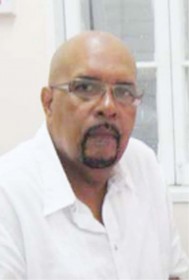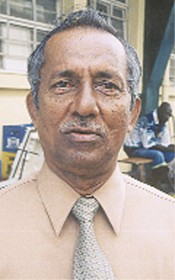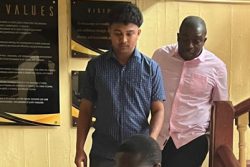Richard Van West Charles wants to lead the PNC into the 2011 general elections
the fact that we differ does not mean that we are enemies.We have to shift away from the notion that if we differ we are forced into separate camps. There is one camp and that camp is the PNC. Unity of purpose has to be the first objective of the new leadership

Richard Van West Charles says that he will serve the People’s National Congress (PNC) under whoever the party may choose as its leader over the weekend. His only caveat is that the process by which a leader is chosen is free and fair. “The issue is not about power for me. The issue is about the development of the country. I believe that the PNC has had some of the best policies for this country and I believe that we still have the intellectual power to be able to provide some of the better solutions for the development of Guyana.”
His statesmanlike views on his preparedness to give service in a lesser capacity does little, however, to conceal the desire of the former Health Minister and son-in-law of Founder Leader Forbes Burnham to supplant Robert Corbin as Leader of the PNC and to lead the party into the next general elections.
His point about the importance of the veracity of the forthcoming leadership elections process is made against the backdrop of persistent rumours that there are issues that remain to be settled if the poll is to be free and fair; and while he says that some of those issues have been settled he believes that the outstanding ones, not least the secrecy of the poll itself and whether delegates’ use their national identification cards during the voting process or whether they use some other instrument issued by the Party Secretariat. His concern over the fairness of the poll, he says, reposes in a fear that if this weekend’s voting process becomes mired in controversy, the implications for the PNC at the 2011 national elections could be dire.
Van West Charles has a point. Accusations of electoral fraud at the level of national elections has long been the weapon of choice of the People’s Progressive Party in its unyielding quest to continually diminish the image of the PNC. That weapon may well have been re-enforced recently through controversy over the fairness of a recent party poll in Georgetown. A botched elections process at the Congress could prove a huge boost for the ruling party’s 2011 elections campaign.

His acknowledgement of the underlying importance of the will of the people at the level of the process through which the PNC elects its leader, is, Van West Charles says, a microcosm of his awareness of a broader national concern with freedom and democracy. “My perception is that the wider Guyanese population wants to have a democratic society in which the electoral process is free and fair. We cannot achieve a democratic state without political parties themselves making the change; and here I speak not only of the PNC but of the wider political culture.”
If Van West Charles embraces the cut and thrust of a fair contest for the leadership of the PNC he is, he says, concerned that the attendant controversies over the likely fairness or otherwise of the poll is serving as a counterproductive distraction from what he believes is the real significance of the Party’s Congress. “The importance of the Congress really reposes in the fact that Guyana is at an important juncture with respect to governance as a whole. Apart from the governance crisis there is the economic crisis and, perhaps most significantly, a serious crisis in terms of the erosion of the rights of the people of Guyana. It is not difficult to see, therefore, that the significance of the Congress reposes in the role of the PNC in seeking to arrest these issues. In that sense the Congress really ought to have a focus on 2011,” he says.
His own blueprint for the process which he says the PNC must begin to pursue now in preparation for the 2011 poll, addresses three issues, the leadership, the membership and what he describes as ‘the restructuring that will enable us to reach beyond our membership and to communicate with all sections of the society.”
As for what he ‘brings to the table’ there is perhaps more than a hint of suspicion that his experiences as a cabinet minister then as an international civil servant in the health sector may have cast him much more in the role of a technocrat than a populist politician. He disagrees, asserting that during the course of his ministerial duties he has always been “a person on the ground, in the field, working with different groups” including youth groups, social, religious and cultural organizations. “I have always reached out to different organizations in building partnerships and alliances in the cause of health and development.”
He talks too about his involvement in ‘Town Hall meetings” in order to secure feedback from communities “as a result of which we were able to make some significant changes in personnel who were not serving the public well. I believe that part of my own strength lies in my ability to work well with people of different views, different orientations and different persuasions.”
If Van West Charles openly admits that over time the party which Forbes Burnham founded has lost support among its traditional following he remains, he says, optimistic that that loss is not irretrievable. “I do not think that the loss is permanent. I believe, however, that it is clear indication that the PNC needs to “reconnect to the people in terms of its role in community development and providing aggressive and effective representation for people’s issues. I think that there are critical weaknesses in terms of the strength of our groups and the performance of our groups.”
Nor does Van West Charles believe that the decline can simply be attributed to a loss of interest and energy ;linked to the party being out of power. “An opposition party,” he says, “has to be in a state of readiness to govern, It therefore has to be in a position where it understands the issues and where its analyses, its solutions and interventions can have a direct bearing on people’s problems. Hence the concept of Shadow Ministers. As an opposition party you have got to be on top of your game.”
What if Van West Charles emerges as “the chosen one” at the party congress poll? “I believe that my first duty is to reach out to those who, for one reason or the other, have been disaffected and to send a message that the fact that we differ does not mean that we are enemies. We have to shift away from the notion that if we differ we are forced into separate camps. There is one camp and that camp is the PNC. Unity of purpose has to be the first objective of the new leadership.”
Then there is the task of confronting what is perhaps the PNC’s most formidable challenge – creating a support base that can mount an effective challenge to the ruling party at the 2011 polls. This too, Van West Charles believes, is achievable. He believes, he says, that the PNC has always been a party of reaching out across divides. “This is where, I believe, we will be challenged to hold true to partnerships and alliances. It has to be seen that the driver of all of our actions is development for all of the citizens of our country. Our parliamentarians, councillors and other representatives have got to understand that while they have come to these positions from the PNC slate, they are, in fact, representatives of all of the people. The party must seek to reach out and gain an understanding with all organizations and all ethnic groups as part of its preparation for 2011.”
Perhaps surprisingly, Van West Charles says that reuniting and rebuilding the PNC “will not be as difficult a challenge as some people feel;” and he believes that his own particular skills and experiences gleaned “from working with ‘different peoples and different groups” makes him eminently qualified to take up that challenge. “Much of it has to do with a preparedness to listen, to deal with different issues and to know when to put things in the parking lot. You have also got to ensure that the systems which you put in place can effectively deal with those issues so that you dispel any doubts that people might have that you are only playing games.” He insists too, that transparency is a key prerequisite for the success of the PNC in the future. “We have to be transparent; everything has got to be above board and there must be no suspicion of underhand movement. This will allow people to trust the PNC and to have confidence in the organization.”
At the national level Van West Charles says that the most worrying issue is the quality of governance. “There is manifest evidence that the present government has not been fair with all groups. They have set a preferred status for their supporters and they have sought in many ways to force people to align themselves in a manner that is consistent with the way in which the resources are aligned and managed. Those who get contracts, for example, are those who are either of the party and those who behave well and are prepared to give the kickback. Part of the whole approach to dealing with the governance issue is creating a culture in which people understand that bribery is not the rule of the day. As it happens, access to some of these privileges is very often connected with race. That too has to be dealt with.”
Race, Van West Charles says, is an issue which Guyana can no longer afford to ignore. “It has to be confronted. It has to be put on the front burner and we have to be able to take the discussion about race to the ground level. We have played with this issue for far too long. I suspect that once we take it to the ground level we will defeat some of the actions of the PPP. They are comfortable with playing the race card and creating insecurities among the races in order to control and manipulate. That is why the PNC must take the issue down to the ground level.”
Van West Charles clearly recognizes that his family tie to Burnham is not an issue that can be wished away. Whether or not it will serve him in good stead in his quest which he seeks to unseat a long-time Burnham loyalist is unclear. What is almost certain, however, is that his connection with Burnham is bound to become an issue if and when he has to seek out a constituency that extends beyond the traditional confines of the PNC. He understands the circumstance but disacknowledging Burnham is not an option. “For me Burnham was a leader, a father-in-law and a friend. I firmly believe that he was a strong and highly intelligent man who was committed to Guyana’s development and to Caricom’s development. I would not divorce myself from Forbes Burnham because, for me, he has contributed significantly and sacrificed a great deal for the development of this country. Every human being makes mistakes and we are different personality types. People react differently to Forbes Burnham. Some people love him and some people don’t understand him.”









